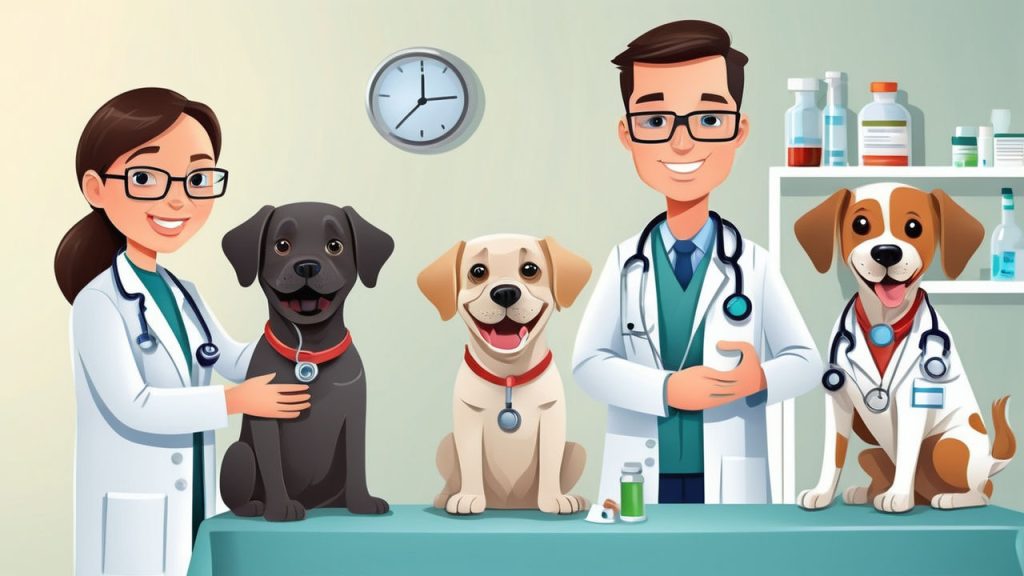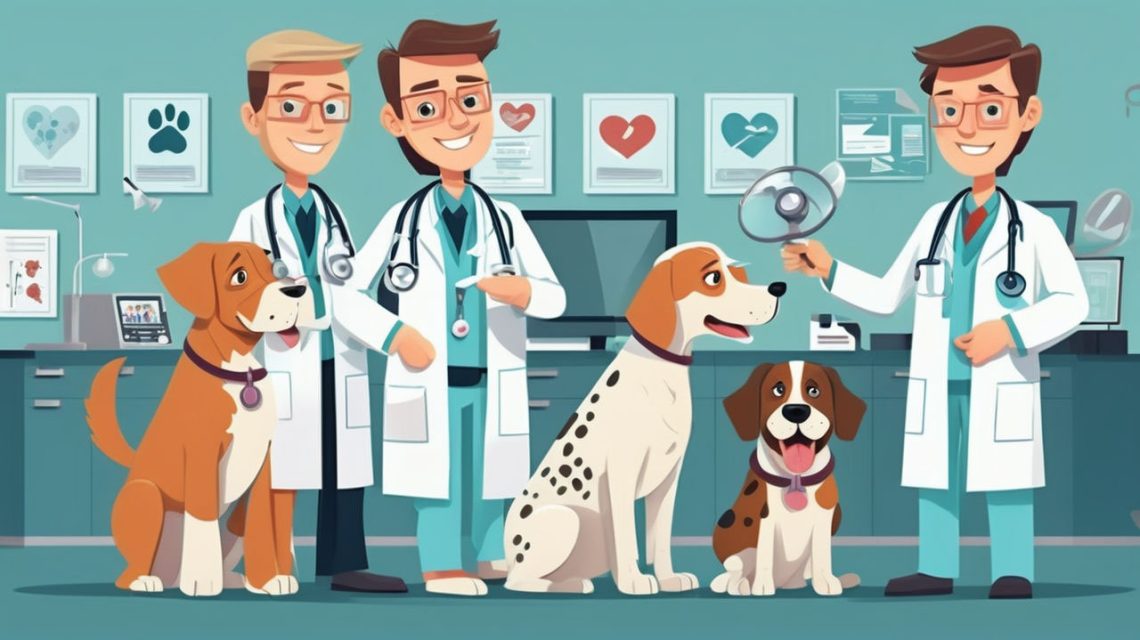Dog Doctors: Ensuring Your Pet’s Health with Expert Care
Your dog’s health and well-being are in the hands of professionals we often refer to as “dog doctors”—more accurately known as veterinarians. These experts play a crucial role in keeping your furry friend healthy, diagnosing illnesses, and providing treatment when necessary. From routine checkups to emergency care, a skilled veterinarian ensures your pet leads a long, happy life.
In this blog, we’ll explore the role of dog doctors, the services they provide, and how to choose the right veterinarian for your dog. With the right care, your dog can stay healthy and thrive.
What Does a Dog Doctor Do?
A dog doctor, or veterinarian, is a medical professional trained to diagnose and treat animals. While veterinarians care for all kinds of animals, many specialize in small animals like dogs. Their work involves a combination of preventive care, diagnostics, and treatment, ensuring that your dog stays healthy throughout their life.
1. Preventive Care and Vaccinations
One of the primary roles of a dog doctor is providing preventive care. This includes vaccinations that protect your dog from serious diseases like rabies, distemper, and parvovirus. Regular checkups allow the vet to monitor your dog’s health, catch early signs of illness, and recommend treatments or lifestyle changes to prevent future problems.
- Tip: Ensure your dog has a vaccination schedule in place and follows up with annual boosters to maintain immunity against common diseases.
2. Diagnosing and Treating Illnesses
When your dog shows signs of illness—whether it’s vomiting, coughing, or lethargy—your vet plays a crucial role in diagnosing the problem. Veterinarians use tools like blood tests, X-rays, and ultrasounds to determine the cause of your dog’s symptoms. From infections to chronic conditions like arthritis or diabetes, a vet can create a treatment plan tailored to your dog’s needs.
3. Surgery and Emergency Care
In addition to regular exams and treatments, veterinarians often perform surgeries when necessary. Common procedures include spaying, neutering, and dental cleanings, as well as more complex surgeries like tumor removal or emergency operations after accidents. In times of crisis, emergency veterinary care ensures your dog receives immediate attention.
Why Regular Vet Visits Are Essential
It’s easy to assume your dog is healthy when they appear energetic and happy, but routine vet visits are essential to catching hidden problems. Just like humans, dogs can suffer from issues that may not show obvious symptoms until they’ve progressed. Regular visits to a dog doctor help keep your pet in top condition by preventing problems before they escalate.
1. Early Detection of Health Issues
Annual checkups give vets the opportunity to detect conditions like dental disease, heart problems, or joint issues early. This proactive approach makes it easier to treat diseases in their early stages, often preventing them from developing into more serious and costly conditions.
2. Monitoring Weight and Nutrition
Obesity is a common problem in dogs and can lead to health complications such as diabetes, joint pain, and heart disease. A veterinarian will track your dog’s weight and offer nutritional advice to ensure they’re getting the right balance of food and exercise.
3. Updating Vaccinations and Preventive Care
During regular checkups, your vet will ensure that your dog is up to date on their vaccinations and preventive treatments, such as flea, tick, and heartworm prevention. This keeps your dog safe from parasites and contagious diseases.
How to Choose the Right Dog Doctor for Your Pet
Choosing the right veterinarian for your dog is important. You want a professional who not only has the expertise but also takes the time to care for your dog with compassion. Here are some tips for finding the perfect vet for your pet.
1. Look for Recommendations
One of the best ways to find a trusted veterinarian is by asking for recommendations from friends, family, or fellow pet owners. People who have had positive experiences with their vet can offer valuable insights.
2. Check Credentials and Experience
Ensure that the vet you choose is licensed and has experience treating dogs. You can check online reviews, visit the clinic’s website, or even ask the vet directly about their qualifications. Many veterinarians specialize in certain areas like surgery, dermatology, or behavior, so it’s important to find one who meets your dog’s specific needs.
- Tip: Consider visiting the clinic to get a sense of the environment. A clean, welcoming clinic with friendly staff is a good sign that your dog will receive excellent care.
3. Communication and Comfort
Your dog doctor should be approachable and willing to answer any questions you have about your pet’s health. Good communication is key to understanding your dog’s treatment options and making informed decisions. Make sure you feel comfortable discussing your concerns with the vet.

Common Health Issues Dog Doctors Treat
Veterinarians see a wide range of health issues in dogs, from minor ailments to more serious diseases. Knowing the common conditions that affect dogs helps you understand what to watch for and when to seek veterinary care.
1. Skin Problems
Dogs often suffer from skin allergies, infections, or parasites like fleas and ticks. These issues can cause itching, hair loss, and discomfort. A vet can diagnose the underlying cause and recommend treatments, such as medications or dietary changes, to improve your dog’s skin health.
2. Ear Infections
Dogs, especially those with floppy ears, are prone to ear infections. Symptoms include head shaking, scratching at the ears, and an unpleasant odor. Ear infections can be caused by bacteria, yeast, or ear mites, and your vet will prescribe the appropriate treatment to clear up the infection.
3. Digestive Issues
Vomiting, diarrhea, and loss of appetite are common symptoms of digestive problems in dogs. These can range from minor issues, like dietary indiscretion, to more serious concerns like pancreatitis or intestinal blockages. A vet will determine the cause and recommend treatment to get your dog back on track.
The Importance of Dental Care for Dogs
Dental care is a vital but often overlooked part of your dog’s overall health. Regular dental checkups and cleanings can prevent painful conditions like gum disease and tooth decay, which can affect your dog’s ability to eat and even lead to systemic infections.
1. Dental Cleanings
Your dog doctor will perform regular dental cleanings to remove plaque and tartar buildup that can lead to gum disease. This not only improves your dog’s breath but also prevents tooth loss and infections.
2. Preventing Gum Disease
Gum disease can lead to pain, difficulty eating, and even infections that spread to vital organs. Regular dental checkups help prevent these issues, ensuring your dog maintains strong, healthy teeth and gums.
- Tip: In addition to professional cleanings, brush your dog’s teeth regularly at home using a pet-safe toothbrush and toothpaste.
How to Prepare for a Visit to the Dog Doctor
Taking your dog to the vet can be stressful for both you and your pet. Preparing in advance can make the experience smoother and less intimidating.
1. Gather Health Records
Before your vet visit, gather any relevant health records, including vaccination history, medications, and past treatments. This helps the vet get a complete picture of your dog’s health.
2. Bring Comfort Items
If your dog gets anxious at the vet, bring along their favorite toy or blanket to help them feel more secure. Offering treats after the visit can also help create positive associations with the vet clinic.
3. Ask Questions
Don’t hesitate to ask your dog doctor questions about your pet’s health, behavior, or treatment options. Whether it’s concerns about diet, exercise, or preventive care, clear communication with your vet ensures your dog gets the best possible care.
FAQs About Dog Doctors
How often should I take my dog to the vet?
- Most dogs should visit the vet at least once a year for a checkup. Senior dogs or those with chronic health issues may need more frequent visits.
What should I look for when choosing a veterinarian?
- Look for a licensed vet with experience treating dogs. It’s also important to feel comfortable with the vet’s communication style and approach to care.
Are vaccines really necessary for my dog?
- Yes, vaccines protect your dog from serious diseases like rabies, distemper, and parvovirus. Regular vaccinations are essential for maintaining your dog’s health.
How can I make vet visits less stressful for my dog?
- Bring comfort items like toys or blankets, and offer treats to reward your dog after the visit. Familiarizing your dog with car rides and the vet’s office can also help reduce anxiety.
How much does a typical vet visit cost?
- The cost of a vet visit varies depending on the services provided. A routine checkup may cost anywhere from $50 to $100, while treatments, tests, or surgery will add to the cost.


